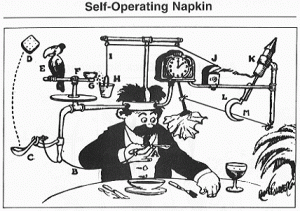 CNN is running a collection of articles about Baby Boomers. They are calling it “Boomers: Age Against the Machine.” We assume it’s a play on the name of the rap metal band Rage Against the Machine, a group that formed in the early 1990s, which is long after most Boomers stopped paying attention to new music. (Sad, but factual.) (Except Adele. Everyone likes Adele.)
CNN is running a collection of articles about Baby Boomers. They are calling it “Boomers: Age Against the Machine.” We assume it’s a play on the name of the rap metal band Rage Against the Machine, a group that formed in the early 1990s, which is long after most Boomers stopped paying attention to new music. (Sad, but factual.) (Except Adele. Everyone likes Adele.)
Given that, the phrase is utterly without meaning. You might rage against an impersonal, mechanized society that seems designed to grind up your spirit and often your physical self. You don’t “age against” anything. And even when the way you age is a kind of resistance, you’re not resisting “the machine.” If you live well and extend your life and the quality of your years, you’re resisting nature. Which is the opposite of “the machine.”
People say, “Well, it’s a play on words.” It isn’t. There’s no play. It’s just headline-writing-by-random-word-association.
There. That feels better.
That’s one thing stupid about this series, this slurry of articles. Here’s another: the list of five top Boomer health trends. First reaction: says who? Second reaction, after scanning the story: is “Boomeritis” really the top health trend for people of this generation? Because really, most of them are sedentary, and overweight. As we like to point out, some do run marathons and triathlons. They ski like crazy. They really like to bike, because it’s low-impact. But does the occasional tendon flare-up really propel Boomeritis over, let’s say, trends in obesity or heart disease?
Ditto for the second top trend, which is “brain games.” Oddly, the trend story here provides a link to another story about how exergames (which are not brain games) are good for the elderly (who are probably a bit older than most Boomers).
The story does highlight several other trends that are worth noting. First, hepatitis C. Get checked for it. Boomers have a 1 in 30 chance of having this very terrible disease and many don’t realize they are infected.
Next, Boomers and STDs. Eighty percent of people between 50 and 90 are having sex. Wrinkled, saggy, semi-passionate, non-weight-bearing sex. You can’t get pregnant; you don’t care what people think; you want to make up for lost time; you want to live for today. And that’s why the incidence of some of your least pleasant infectious diseases is up. In just the last decade, syphilis and chlamydia cases have nearly tripled in adults aged 45 to 64.
One trend that isn’t on the top five list—but does appear elsewhere on CNN’s site—is the surprising increase in the use of testosterone. “In 2011, consumers spent approximately $1.6 billion on prescription testosterone therapies, almost triple the amount spent in 2006,” says CNN, citing a market research company. Let’s belabor this point: sales for what is often an elective medical therapy tripled while the country was going through an economic catastrophe.
And it tripled even though the benefits are uneven. Something like 20 percent of men don’t benefit “fully” from hormone therapy and the results can plateau “anywhere from six weeks to one year into treatment.” And once men begin using testosterone, they rarely stop: “Once you start, your body begins shutting down natural production of the hormone, thinking it’s no longer needed….This can lead to ‘shrinkage’ of the testicles and a suppression of sperm production.”
There are also concerns about the impact on prostate cancer, and the potential for cardiovascular problems. (In 2010, the National Institute on Aging reported on a study of testosterone treatment that found “a higher rate of adverse cardiovascular events, such as heart attacks and elevated blood pressure, in a group of older men receiving testosterone gel compared to those receiving placebo.”)
Still, triple the sales in six years.
Why? Because, according to Dr. Harvey Bartnof, whose “practice focuses on age management medicine and hormone replacement therapies for both men and women” people want to stay active as they age. And again with the machine references: “Bartnof compares [testosterone] to oil in a machine — while other systems make your body ‘go,’ hormones such as testosterone grease the wheels so they work smoothly.”
Image: Professor Lucifer Butts by Rube Goldberg (1915), via Wikimedia Commons.









